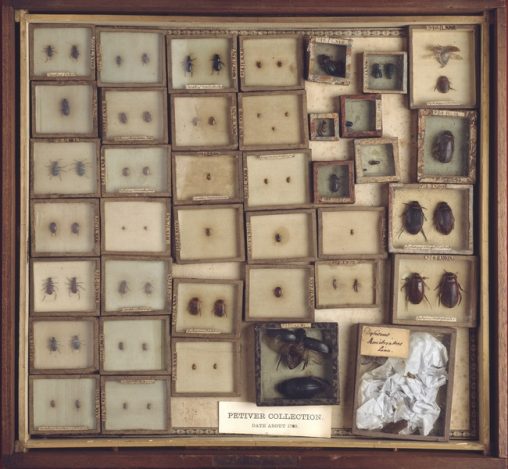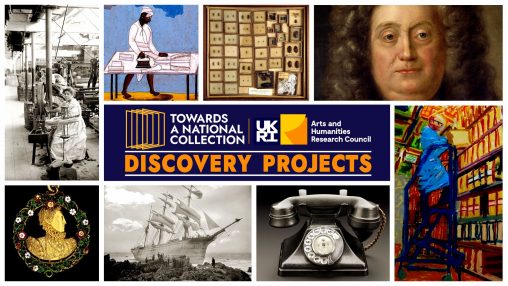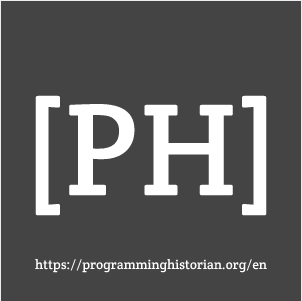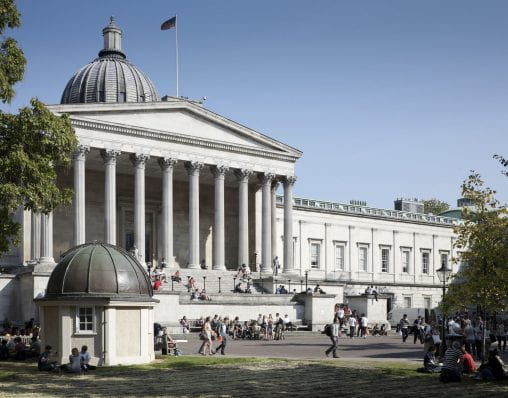UCLDH to participate in £14.5m Towards a National Collection
By Lucy Stagg, on 21 September 2021
The Arts and Humanities Research Council (AHRC) has awarded £14.5m to 5 research projects to connect the UK’s cultural artefacts and historical archives in new and transformative ways. The announcement today of the five major projects forming the largest investment of Towards a National Collection, a five-year research programme, reveals the first insights into how thousands of disparate collections could be explored by public audiences and academic researchers in the future. UCLDH is delighted to participate with The Sloane Lab: Looking back to build future shared collections (Principal Investigator: UCLDH Director, Professor Julianne Nyhan, UCL and TU Darmstadt). Project partners and collaborators include: British Museum, Natural History Museum, British Library, Historic Environment Scotland, Royal Botanic Garden Edinburgh, National Museums of Scotland, Community Archives and Heritage Group, Down County Museum, National Galleries of Scotland, Oxford University Herbaria, Collecting the West project funded by the Australian Research Council & metaphacts. The participatory methodology that the underpins the project will additionally allow ongoing research with a wide range of expert and interested communities over the coming years.

Collection of beetles, Case containing beetles from the Joseph Dandridge and Petiver collections. Some have Hans Sloane’s catalogue numbers. C0165553 ©The Trustees of the Natural History Museum, London
Focusing on the vast collections of Sir Hans Sloane in public institutions, this project will work with expert and interested communities including museum audiences to link the present with the past to allow the links between Sloane’s collections and catalogues to be re-established across the Natural History Museum, the British Library, and the British Museum (plus others that have relevant material). The main outcome of the project will be a freely available, online digital lab – the Sloane lab – that will offer researchers, curators and the public new opportunities to search, explore, and engage critically with key questions about our digital cultural heritage.
The project’s central questions include: How can we make specialist users and members of the public more aware of the contested nature of museum collections? What is the role of digital tools in facilitating discussions on imperialism, colonialism, slavery, loss and destruction, that have shaped the national collection? And who gets to contribute to, and shape, research on how memory institutions can reach across their institutional boundaries, subject-specialties and even countries so as to better support their audiences, visitors and users? Community Fellows will enhance the research, which will later form part of a traveling exhibition.
Project PI, Professor Julianne Nyhan, says of the project:
This exciting new project will devise automated and augmented means of mending the broken links between the past and present of the UK’s founding collection in the catalogues of the British Museum, Natural History Museum and the British Library. I am especially excited about the participatory design of the project, and the research with diverse publics that this funding will support. Our aim is to intertwine technological and participatory research, community consultation and public engagement, to embed diverse community views into the design, execution and validation of the Sloane Lab, and indeed, the future of the national collection.

Image by Colin McDowall, courtesy of Towards a National Collection
The Towards a National Collection investigation is the largest of its kind to be undertaken to date, anywhere in the world. It involves 15 universities and 63 heritage collections and institutions of different scales, with more than 120 individual researchers and collaborators.
Professor Christopher Smith, Executive Chair of the Arts and Humanities Research Council said:
“This moment marks the start of the most ambitious phase of research and development we have ever undertaken as a country in the space where culture and heritage meet AI technology. Towards a National Collection is leading us to a long-term vision of a new national research infrastructure that will be of benefit to collections, researchers and audiences right across the UK.”
Dr Hartwig Fischer, Director of the British Museum said:
“This unprecedented investment of funding by the AHRC into these five projects will allow us to explore what the digital future for our organisations can and should be. A future where anyone can search across collections cared for in different parts of the UK, to pursue their passion for knowledge and understanding, discover their own pasts and answer their own questions. Towards a National Collection will strengthen Britain’s international leadership in this area. Each project in their own rightly deserves to be celebrated and I cannot wait to see what happens when we bring all this talent and dedication together to build the new future for our shared national collection.”
Rebecca Bailey, Programme Director, Towards a National Collection
“Today, for the first time, we can reveal the direction of travel for one of the UK’s most collaborative research programmes. Collectively, we aim to dissolve the disciplinary silos that exist in universities and public collections. Our driving mission is to open up global access to the UK’s world class collections. By harnessing emerging technologies to the creative interdisciplinary talents of our research teams, eventually everyone will have the ability to access an outstanding trove of stories, imagery and research linking together the limitless ideas and avenues in our national collections. From community archives to overlooked artists; from botanical specimens to the ship-wrecked Mary Rose.”
 Close
Close







